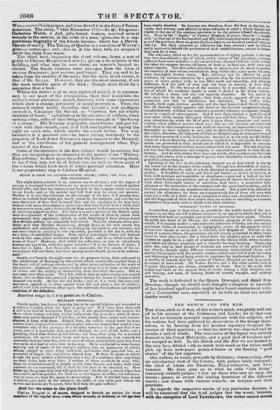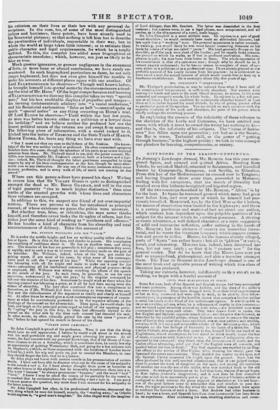THE BENCH AND THE BAR.
THE wine, such as it was, of this writer's mind, was pretty well run off in his account of the Commons and Lords; for in that case he had an intimate eyesight acquaintance with his subjects, and his notions had been gathered by observation of the things them- selves, or by hearing from his brother reporters frequent dis- cussion of their qualities; so that his matter was digested and its results a sort of whole. The remainder of the liquor was entirely drained in his Great Metropolis, and a good deal of feculent mat- ter escaped as well. In the Bench and the Bur we are treated to the very lees, diluted a■ ith as much wish-wash as the writer could pick up from newspaper penny-a-liners or the floating " good stories" of the law reporters. Our author, as usual, proceeds by divisions; commencing, after an introductory view of the Courts, with judges lately deceased; the chief of whom are ERSKINE, ELLENHOEOUH, and TEN: VIRDEN. He then goes on to what he calls "late living (meaning retired) judges; ti:kes up those who now sit upon the bench ; passes in review the leading barristers of the different courts; and closes with various remarks on lawyers and thor practices. As regards the respective merits of any particular division, it will be conceived that the dead judges fare the worst; because, with the exception of Lord TXXVIRDEN, the writer cannot season his criticism on their lives or their law with any personal de- griptions. In the case, too, of some of the most distinguished judges and barristers, these points, have been already used in his Senatorial pictures; so that nothing is left him but to describe she peculiarities of individuals, respectable in their way, but in whom the world at large takes little interest ; or to estimate their public character and legal acquirements, for which he is totally uofitted. To this, the compiler has added some biographical or characteristic anecdotes ; which, however, are just as likely to be false as true.
Much greater ignorance, or grosser negligence in the statement of facts, or more loose or absurd conclusions, we have rarely en- countered. In such biographical particulars as dates, he not only jumps haphazard, but does not even give himself the trouble to make his accounts at different places agree with one another. Of Lord ELLENBOROUGH he observes—" Though well known before, be brought himself into special notice by the circumstances attend- ing the trial of Mr. Hone." Of the legal comprehension and learning ofELLErsaoitonnx we dare say this compiler takes no very "special note,' but his less creditable displa)s of prejudice and temper— his turning (aristocratical) adultery into " a venial misfortune," and his Senatorial exclamation "false as hell "—received luite as much " special notice" as any thing occurring on HONE 'S trial. Of Lord Et.nost he observes—" Until within the last few years, no man was better known either as a politician or a lawyer than his lordship:" and we believe neither the profound law nor the honest political mania of the veteran are yet swept from memory. The following piece of information, with a moral tacked to it, bitched into the notice of ERSKINE anti the State Trials of HARDY, Humus Tomo, &e. beats any thing we have ever met with.
"But I must not shut my eyes to the:defects of Mr. Erskine. His knows ledge of the law was neither varied or profound. He often committed egregious blunders from this cause, though the splendour of his parts even orator diverted attention from them. Mr. Thelwall stated to me, that the junior counsel, Mr. Gibbs, was immeasurably Mr. Erskine's superior, both as a lawyer sod a logi- cian; indeed, Mr. Thelwall thought the latter gentleman unequalled in those respects by any of his then contemporaries at the bar, though he never after- wards rose to any distinction. He was one of the many instances which occur ia every profession, and in every walk of life, of merit not meeting its due reward.
Where can this penny-a-liner have passed his days? Webeg to assure him that Sir VICARY GIBBS is quite as distinguished amongst the dead as Mr. Baron GRAHAM, and will in the eyes of legal posterity " rise to much higher distinction" than nine tenths of the stunted growths with whose lives and characters these volumes are occupied.
In addition to this, we suspect our friend of not over-impartial motives. There are persons at the bar introduced as principal counsel, of whose existence we guess the public were unaware. But whether true, false, or ridiculous, the man never thinks himself, and therefore never tasks the tIrvights of others, but fur- nishes just the same kind of reading as " accidents and offences." He has besides a kind of character from his absurdity and total unconsciousness of delicacy. Take this account of
MR. JUSTICE WILLIAMS AND HIS " FACE."
HC is under the middle height, and has no striking quality either about his face or figure. He is thin in the face, and slender in person. His complexion has something of ruddiness about it. Ile has an aquiline nose, and sharp eyes. The muscles of his face are generally in full play ; sometimes they move so rapidly, and in such a way as to cause an involuntary smile on the part of the beholder. Mr. Williams, indeed, when at the bar, got credit for gaining many, if not most of his cases, by what some Of his contempo.
rates used to call the " power of his face. While the opposing counsel was labouring with all Ilia might and main to make out a case for his client—exhausting all his intellectual resources and physical powers--while so employed, Mr. Williams was sitting watching the effects of the speech on the minds of the jury. In such cases, he generally, to use his own espreosion, endeavoured tri " ogle the jury," by the singular command; he had over the muscles of his face. Sometimes he would wink at them when the opposing counsel was labouriog a point, as it all he had been saying were the essence of abstudity. The jury often construed this into a compliment to themselves, as if Mr. 'Williams had been intimating to them that he was sure they saw the ridiculousness of the argument as readily and clearly as himself did. At other times he would give a most contemptuous expression of counte- nance at what he conveniently pretended to be the: supreme silliness of the pleadings of the counsel on the adverse side. Then again, his would shake his head, and laugh at the principal points urged on behalf of the opposing party. By "ogling" the jury in this way, he often had effectually replied to the counsel on the other side by the time such counsel had resumed his seat. In other words, he often virtually gained his case by the mere " power of face," before he had opened his mouth in favour of his client.
"PLAIN JOHN CAMVBELL."
Sir John Campbell is proud of his profession. Were it not that the thing would have an odd appearance, I believe he would walk about in the streets with his well-powdered wig and ample gown adorning his person. At all events, the fact consists with my personal knowledge, that if the House of Cann. mons chances to sit on a Saturday, which it sometimes does, be rarely lets slip an opportunity of quitting Westminster Hall, and going for a few minutes into St. Stephen's, (which, as those acquainted with the localities of London know is hard by,) with his wig and gown on, just to remind the Members, in case they should forget the fact, that he is a lawyer. Sir John plays sad havoc with certain vowels in his pronunciation of certain words. I have not been able to discover what can be the cause of his antipathy to the vowels • and o for I have always thought them quite as harmless as any other letters in the alphabet ; but he invariably transforms theni into a or. The word " because " he always pronounces " bucause," and the word " lord " "lard." I know I may be asked the reason of his partiality for the vowel or, so marked that he metamorphoses the unuffending rand o into it. I am sorry I cannot answer the question, any more than I can account for his antipathy to tlie latter letters.
Sir John Campbell has often, in his professional character, denounced the very thing which he once did himself, namely, the "stealing away," as Othello Would express it, "a good man's daughter." Sir John eloped with the daughter of Lord Abinger, then Mr. Searlett. The latter was dissatisfied in the first instance ; but mstters were, to use a legal phrase, soon compromised, and all parties, as in the denouement of a novel, made happy. Sir John Campbell is a stout athletic man. He rejoice. in • pair of good round shoulders : lie would certainly have made an able-bodied labourer, had fate made him a " working" man. His personal appearance is rather uncouth. In walking, you would fancy he was sonic farmer measuring distance. on his lands by means of what are called " paces." His head generally droops on hie shoulder, as if the neck were tired of the hurtles ; and he usually looks towards she ground on which he walks, as if lost in profound meditation. His com- plexion is pale; his eyes have little lustre in them. The whole expression of his countenance is that of a care-worn man ; though why he should be so. I cannot exactly understand; for he has no reason to complain of want of our- ceso, either as a politician or as a professional man. I have already glanced at the probable amount of his yearly income from his practice: he is understood to have saved a 311111 the annual interest of which would enable him to keep up s handsome establishment. He is seemingly about fifty. five years of age.
SIR. THESIGER'S "STRETCHING " Mr. Thesiger's gesticulation, as may be inferred from what I have said of his constitutional temperament, is suffieiently abundant. Not content witio moving his hands and arms in the most liberal manner, he moves, in hi. more animated and energetic moods, MA whole Italy. He rejoices iii a fine tall per- son at all times ; but I am confident he occasionally stretches hint-elf at lcast three or fair inches beyond his usual altitude, by way of giving greater effect to particular parts of his speeches. You are struck on such occuions with the superior ehistieity of his neck and shoulders, the parts of his person which chiefly undergo the stretching process.
In explaining the reasons of the inferiority of these volumes to. the sketches of the Lords and Commons, we have omitted one cause, with which it must be owned the writer has nothing to do— and that is, the int..riority of his subjects. The "curse of feeble- ness" has fallen upon our generation ; yet bad as is the Senate.. the Bar is worse. Technical skill, or the power of " getting through business," is the highest quality : we look in vain atnott,gst our pleaders for learning, con:prehension, or oratory.



























 Previous page
Previous page